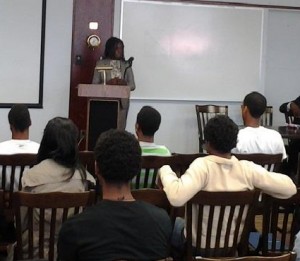By Dr. Valerie Davis, Associate Professor, School of Security and Global Studies at American Public University
Summer is the universal season for fun and games even if you’re a member of the U.S. intelligence community. During the month of July, intelligence professionals and high school students will converge at Howard University in Washington, D.C. for the 2013 Analytical Boot Camp. Hosted by the Intelligence Community Center of Academic Excellence with the help of American Public University, campers will collaborate to address national security issues through gamification learning.

As an American Public University professor, I’ve discovered that gamification is a highly persuasive learning technique because it triggers motivated learning and can more effectively connect students with a variety of subjects. It helps to create an active and memorable classroom experience for learners and instructors alike.
The boot camp will teach how intelligence analysts make crucial decisions that can have serious national and personal security consequences. Instructors will create false personas on social media outlets like Facebook and Twitter to teach methods for determining whether an individual is real or fabricated. By utilizing popular social networks, students will be immersed in a familiar environment that leads to unexpected outcomes. Just about every teen has used Facebook and Twitter, but how many have analyzed and assessed false personas?
The key to applying gamification in a classroom setting is higher engagement, which leads to a sustained interest in the subject. Since infancy, developing humans have explored and learned the bulk of their life skills through natural game and role playing. With the explosion of rewards-based video games, learners can easily connect with representational achievement and goals such as opening new levels of discovery, earning badges and reaching higher point totals on leader boards.
I admit that a Mario Bros. learning mentality has infiltrated our classrooms not too long after a time when students caught playing video games were sent to the principal’s office. As online learning and gaming technology continue to proliferate, so too will the adoption of gamification in all areas of education.
In addition to integrating intelligence gaming elements into the boot camp, students will learn more about the U.S. intelligence community from a practitioner’s perspective. They’ll participate in case scenarios that bring real-world experiences into the classroom. They’ll also have the opportunity to hone their academic skills while exploring careers in engineering, cyber security and national defense intelligence.
Who knows? A future CIA director may one day trace his or her career origins back to an analytical boot camp.
About the Author
Dr. Valerie E. Davis is an associate professor in the School of Security and Global Studies at American Public University. She served as senior intelligence professional and educator in the U.S. Air Force for over 23 years until her retirement. Her assignments in the Intelligence Community encompass a variety of disciplines across the Intelligence Community, including Theater, Major Commands, wing and national levels.
Comments are closed.